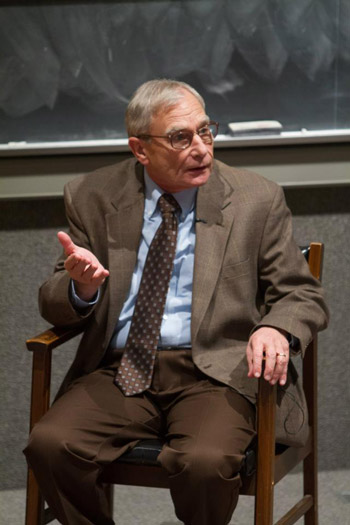Gary Eichten
MPR’s editor-at-large visits campus as McCarthy scholar
February 21, 2013
By Glenda Isaacs Burgeson

Award-winning Minnesota Public Radio broadcaster Gary Eichten '69 visited the College of Saint Benedict and Saint John's University as the Eugene J. McCarthy Center's scholar-in-residence Feb. 11-14.
Gary Eichten '69 is one lucky guy. Just ask him.
The award-winning Minnesota Public Radio broadcaster talked about his good fortune while visiting the College of Saint Benedict and Saint John's University as the Eugene J. McCarthy Center's scholar-in-residence Feb. 11-14.
Eichten met with students, faculty and staff in a variety of venues, including classes, public presentations and encounters with small groups of students in a week that opened with a public conversation with CSB/SJU Professor and Saint John's University Chair in Critical Thinking Nicholas Hayes. It concluded with a keynote event featuring a public conversation and question-and-answer session with Gov. Mark Dayton.
As Eichten tells it, Lady Luck smiled on him when he got a liberal arts education as an SJU undergraduate, after he "chickened out" of his first choice, the University of Minnesota - too big for a guy from Mankato, Minn.
He was lucky as well to attend SJU at a time when then Saint John's President Fr. Colman Barry, OSB, was scheming with SJU graduate Bill Kling '64 to start a small radio station with a big vision, to offer world class cultural programming and public affairs to a local audience.
KSJR-FM went on the air in 1967, led by Kling with one engineer and a crew of SJU students, including Eichten.
To be sure, this unlikely crew faced challenges. Eichten recalled an overzealous cleaning lady who would raise the arm of the record turntable - in mid-broadcast - and give the vinyl record a thorough dusting, all the while oblivious to the fact she had just interrupted programming for the dozen or so avid Stearns County listeners the station had in its early days.
Also oblivious to the world class programming were the gophers that routinely gnawed the cables linking the station to the transmitter, knocking the station off the air.
In hindsight, the vision of Barry and Kling seems obvious. Eventually, the station outgrew its humble beginnings and evolved into the MPR we know now, with more than 800,000 listeners and widely recognized as one of the best public radio stations in the country, as well as a driving force for the success of National Public Radio.
At the time, to Eichten, "It was just a job." However, over time, he said he realized he loved doing radio.
Throughout his 40-plus-year career at MPR, Eichten worked a variety of assignments - news director, special events producer and station manager. For more than 20 years, as host of MPR's "Midday," Eichten earned a reputation among listeners, as well as guests, for fairness. His impartiality was such that, when he retired last year and accolades poured forth, the most common observation was that no one knew his political tilt.
Eichten's conversational interview style also stood in sharp contrast with the adversarial "gotcha" journalism in vogue. He has a simple explanation for that.
"I never considered myself a journalist," said the winner of the prestigious 2011 Graven Award from the Premack Public Affairs Journalism Awards Board for his contribution to excellence in the journalism profession. In 2007, Eichten was inducted into the Pavek Museum of Broadcasting's Hall of Fame. He also is the recipient of a Corporation for Public Broadcasting award for best local news program, and he assisted in the development of two Peabody award-winning documentaries.
"I was a radio announcer who had a public affairs program," he said matter-of-factly.
He may not have considered himself a journalist, but it was his voice MPR listeners heard on Oct. 25, 2002, when a plane carrying U.S. Sen. Paul Wellstone went down near Eveleth in northern Minnesota, ending the lives of all eight on board.
Eichten recalled the details of that day before a rapt audience. "Midday" was airing a pre-recorded speech, and Eichten and his producer were preparing to leave St. Paul for Duluth for a political debate when they first realized there was a problem.
"Something had happened," he said, but they didn't know what exactly. It soon became clear there was a very important story, but it was not clear what the story was.
"We couldn't just sit there and play a pre-recorded speech," he said.
Eichten went on the air to explain what they knew - which was little - and what they didn't know - which was quite a bit. His main objective was to keep people informed in a non-emotional way.
"I think I did my job," he said of the experience that remains a searing memory.
Although Eichten's career spanned a time of growing hyper-partisanship and heated political rhetoric, he managed to avoid political theater by treating his guests with respect and focusing on questions he thought his listeners wanted asked.
And while his down-home style made it appear easy - whether he was interviewing an economist or historian, a governor or a U.S. senator - Eichten acknowledged he worked hard to achieve that easy-going conversational style.
For his "Midday" program, he got up at 3 a.m. to study the issues of the day, went on the air at 11 a.m. for a two-hour broadcast and then continued working until 8 p.m.
Although Eichten has retired from daily broadcasts, as luck would have it, MPR listeners will still hear his voice from time to time as he works on special projects.
Judging from the enthusiastic response of the CSB and SJU students who spent time with him, he may have some new listeners. More dumb luck.
